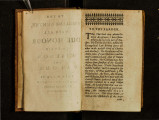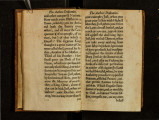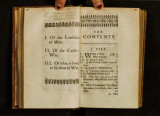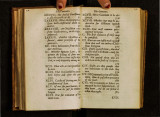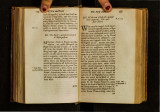| OCR Text |
Show XC I II. Thnt it is lawf.ul.to pardOJt, hoth before and after the t ltt vidore eft T enal Law. it;' fragmento a_pudsrobzutn IT follows that we confider, whether tt~ftulo de ~a- fomecimes it be la vvfull to gram a par-g~ ratu , tn o- d F h S . l. , d b ratione Tullii .on. or ~ e tozc'<! t eny ~ ut upon a pr~ Mur":na, hg_ht ground : Pardon, fay they, u a re~ m fine hbro" mi!fion of due punijhment : but a wife man rC _u 1 m Sen .. de · gives every one his due. Here the fallacy ementta. I . h d d C011tra eos bent yes m t e wor ue. For , if you under ~ 'Diodnrus Sic. fland punilhment co be due. to him who infr~gme~Iis, hath done a fault, (o that he may be purema mtl~~ nilhed without inju~, it will not hence p .en.e ex aw.wne. f ll . f . . Pro Chriftia- o ow , 1 one pum lum not , he doth nisfententiam wrong: But , if you conceive punilhdicel Cypr.ep. ment io to be due from a wife man that ft. Aliahe{t it IS h!s duty to exaCt it we fay that is Phil•fop or.um , - ' . ' & Stl1icorum not ~ ~ ways io, and therefore 10 this fenfe, ratio, IJiti di- pumlht_nent may be, not due , but one!y c1mt om~ia pee" law.f;tll. And that may be true, b0th becatapai ·~atj]t, (ore the conflitution of a penal Law and & vzrumt:gr~,· after. Before a penal Law ordained ;here vem 11011 1 acz e . ' jltai oporttre. lS yet no dou~t but punilhment may have I?,ter c~r-tijtim101 pl ace : becaufe naturally he chat is a deauttmtJ. P~. to-l : nquent is in that !tate, that he may !awf1phmosd~ utr•- fully be punilhed : but it doth not there .. m11 e1.a. f r tJulian. de ore rollow, that the punilhmentought t Eufebia : Non to be exaCted; becaufe this depends upon tni"! ~ q~Ji [11nt the co,nnexion of the ends; for whic'h pu· ~er~!' ma.~~ t~a ; nilh.ment was ordained, with the puniJb .. H4JJ,punmq; ' . r. .If Wh r . d b h7H perire ut1q11e ment It 1e • ere1ore 1f thofe en s y necrffi ~. : . themklves, in a moral eltimation, be not · necelfary; The fteoml P•'· necdfary ; or, if other ends , on the op .. pofit part, occur, not ·lefs profitable or necdfary ; ot , if the ends propofed to ~he punifhment. may be attaine~ another ·way ; now 1~ appears , 'there 1s noth~ng which preciiely obligeth to the exa6bng of the punifhment. An example of the · tirft may be in a fin known to very few : the publick traduction whereof may thetf" re not be neceffary, yea it rna y be hurt-full; to which that of Cicero i-s pertinent, . CG>ncerning one Xerxe'S : It was nvt fit .Ad ~mtum perhaps to difmifs him being brought tofi·at. I. ;I. judgmetit; hut that he jhfJu/d he enquired ~fter and hrought to judgment, was not necefJ~P"J. An.- e~ample of the fec?nd, i.n him, who oppoieth co the faulte1ther h1s own or his parents good deeds worthy of reco.tnpence ; for, faith Seneca , a henefit fuperveme;;t fujfers not the tnjury to ap-pear. Of the third, in him, whois al;llen-d. ed with words, or with words hath fatif-fi' d the wronged party , fo that there is now no need. of punilhment to thofe ends. And this is one part of clemency freeing from punilhment; which the He- ..., • b ·r r. .a.· r · h I l .;r, .t ""CJiU•' tc.• rtW wne man re•:pe~.Am~ 1a1t ,· t oeco- . , . 6 _ '-' £: J~l f11"4 t ~ ·n IIJ• meth a juft man to be merciJull. For, be- u. 1,. • caufe aU punifhment, expecially the more grievous, hath fomewhat, which by it felf conGdered , is repugnant , not indeed to }\lflice, but to Charity, Reafon eafily pern~its to abfiein from it, unlefs greater and juller ~harity do as it yvere irrefra ... · gably |







